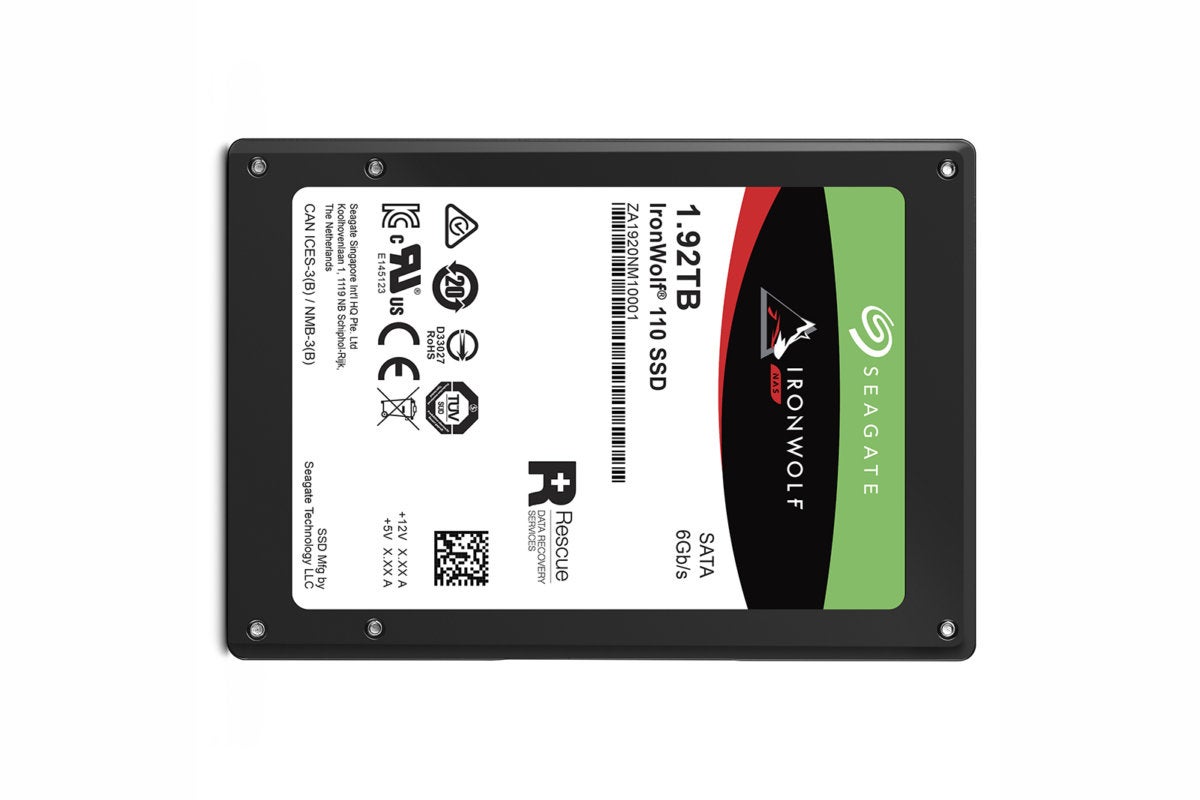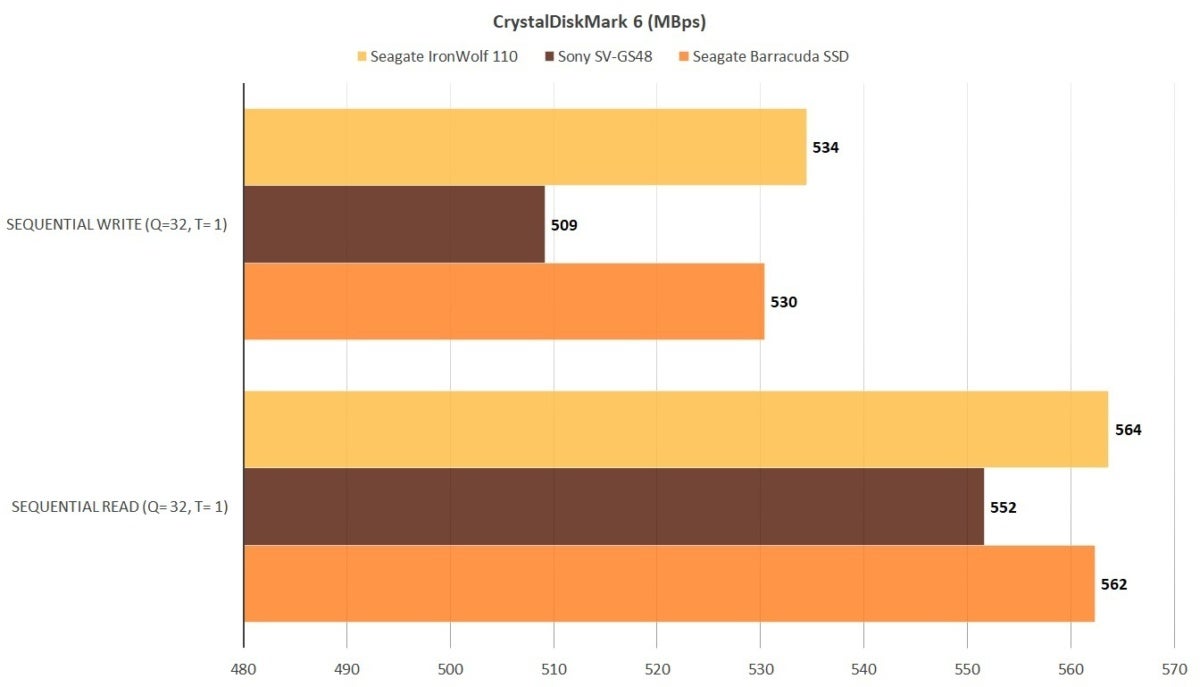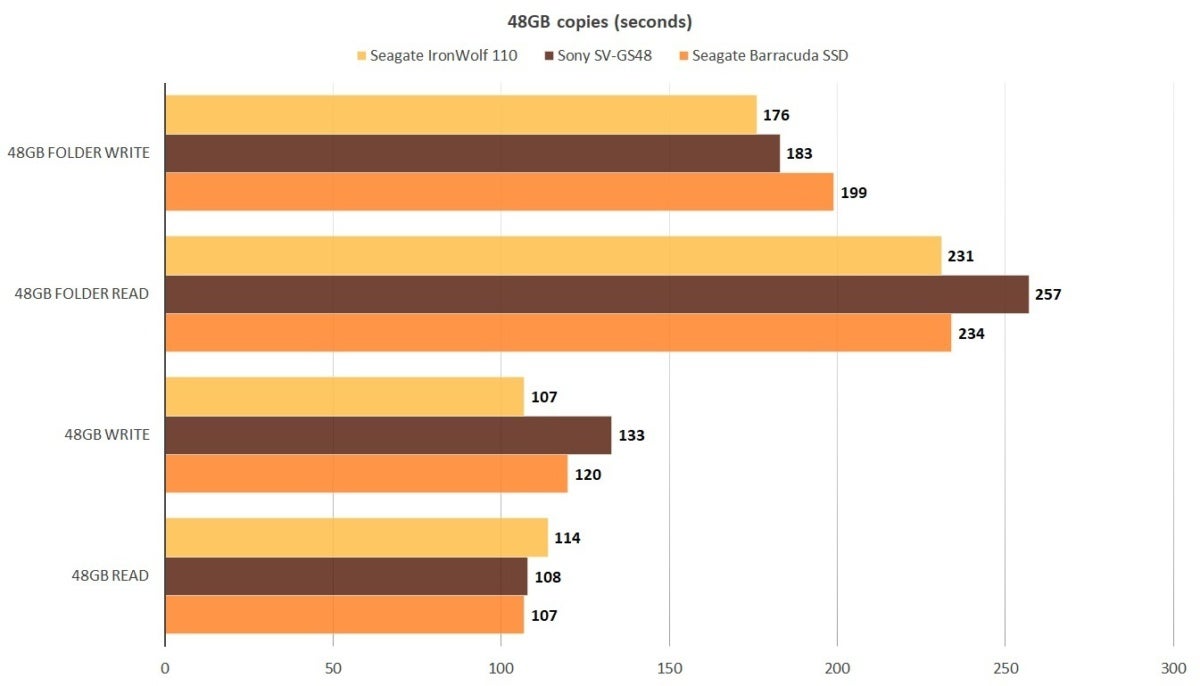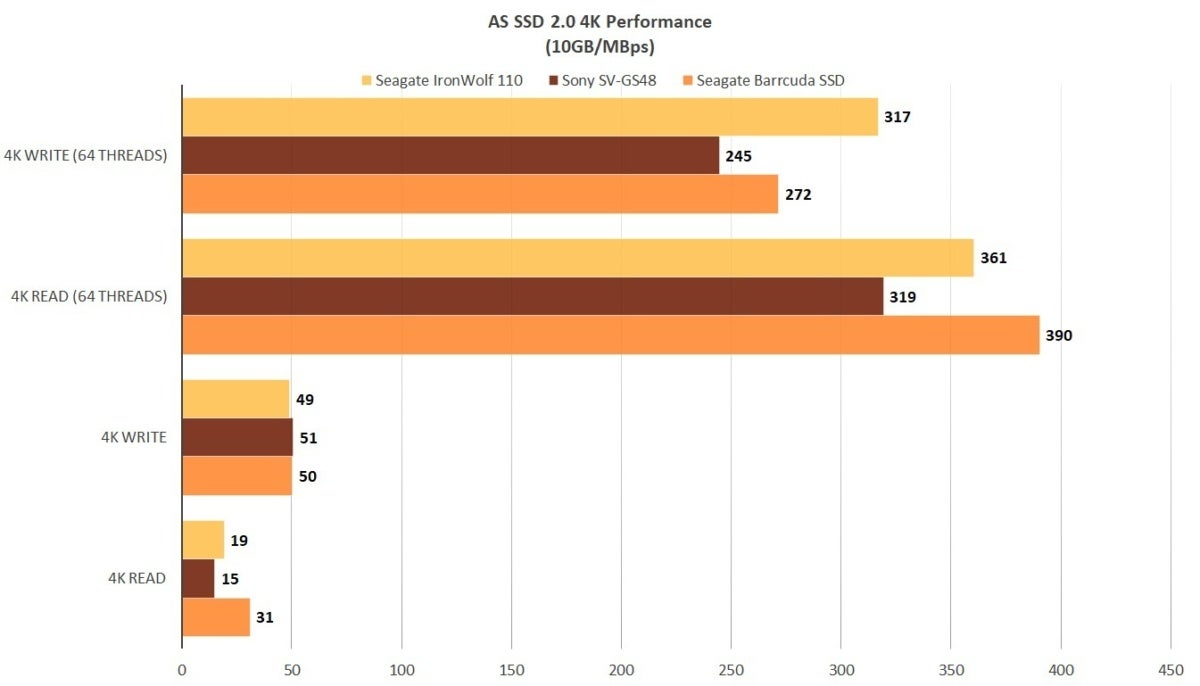Seagate IronWolf 110 2.5-inch SSD: Up to 4TB of NAS storage designed to last, but a lot of cash - carteropinight

Seagate
At a Glance
Expert's Rating
Pros
- Long life anticipation
- Good performance
- Five-yr warranty
- Over-provisioning tweakable via software
Cons
- Comparatively high price per gigabyte
Our Finding of fact
With about four multiplication the normal seniority rating (TBW), good execution, and capacities finished to 4TB (3.84TB as shipped), the Seagate IronWolf 110 is a opportune investment for a NAS box, or level end users World Health Organization measure reliability.
Foremost Prices Today

Not Available
While Intel's Optane SSDs set the received for longevity ratings away letting you write out a ridiculous 18 terabytes for every 1GB of memory connected board, there are NAND-based SSDs that will endure on the far side the average.
One such drive, Seagate's new TLC-supported IronWolf 110 SSD, is rated for just under 2TBW (TeraBytes Written) for every 1GB of capacity—two to four times the norm for a consumer drive. The endurance is indicative of the 110's intended role in NAS boxes, where it's bound to assure heavier workloads, though the drive is also fountainhead suited for Personal computer users who want above-average reliability.
Models and Leontyne Price
The IronWolf 110 SSD is purchasable in v capacities for roughly 25 to 30 cents per GB. Additionally to the 1.92TB capacity we time-tested ($490 on Amazon), the drive comes in capacities of 240GB ($93 on AmazonRemove non-product link), 480GB ($148 on AmazonRemove not-product link), 960GB ($276 on AmazonOff not-production tie), and 3.82TB ($980 on AmazonRemove non-product link). Those are the prices listed on Amazon as of 4/30/2019; Seagate had non provided pricing at the time of this writing. Considering the five-year warranty, two-years of information recuperation services, and high TBW ratings, that's not bad at all. You could last cheaper, simply non with the same guarantees.
Capacity versus unit longevity
Spell Seagate is hardly the first vendor to make use of over-provisioning (the practice is as old as NAND storage itself), IT's the key to keeping an SSD running longer. In simple terms, that means in that respect's a lot of NAND in reserve to replace worn out cells. And yes, NAND cells may be written to only a certain number of times earlier they throw up the spectre.
If you take the IronWolf 110's capacities, they're smaller than the average: 240GB, 480GB, 960GB, 1.92TB, and 3.84TB. This substance Seagate is likely guardianship quite a trifle of NAND in reserve.
Alas, the IronWolf 110 is non the longest-rated NAND-founded SSD we've had pass our portals. Not by a long-handled colourful. That distinction would like with the Sony G Serial Professional SV-G48 which is rated for 4TBW for all 1GB of capacity. Same delegation, better specs, though a bit slower performance.
Design and specs
As already noted, the IronWolf 110 is a 2.5-inch, SATA 6Gbps SSD. It's 7mm thick disregardless what the capacity, which seemed a trifle counterintuitive at the start. At 77 grams (about 0.17 pounds) the IronWolf 110 is a trifle heavier than most, which is reflective of good construction, and—I thought—the amount of NAND on gameboard. However, according to the spec sheet, all the capacities count on the nose the comparable. Apparently 64-stratum TLC NAND is weightless, or perhaps someone took the time to weigh only one drive.
Whatever the actual weightiness, 77 grams is close enough for rock and roll, and to calculate how much heavier your laptop will be if you install one of these puppies.
 Seagate
Seagate I would've thought the IronWolf 110's weight would deviate slightly aside capacity, but the specification sheet says the 240GB weighs the same 77 grams equally the 3.84TB model. Regardless, there's no difference worth distressful about.
Saying an SSD is designed for NAS is a relatively minor claim. There's the endurance lengthy aside all over-provisioning for heavy use, then there's optimizing the drive for the unsurprising workload profile: As a cache for hard drives, or with other SSDs in an array. Some those workloads are actually instead common, and our try numbers bear KO'd that the drive is perfectly at home in past roles.
The IronWolf 110 uses Seagate's DuraWrite technology, which uses lossless compression to reduce the amount of information written. That's something that's been going on in SSDs for quite while. The drive also retains enough juice in a power outage to publish the data in the cache to its permanent location to deflect data loss.
Performance
The 1.92TB IronWolf 110 (golden bars) that I tested proved a very good, and very concordant performing artist. IT turned in nice numbers in CrystalDiskMark and AS SSD, and passed draft in our 48GB copy tests. It was also smooth and responsive in the QNAP NAS corner I installed a pair of them in, likewise as one beat back solo in a QSAN NAS box as an SSD cache for ii hard drives. It's most the quickest SATA SSD we've tested, following the loss leader by a thin gross profit.
 IDG
IDG CrystalDiskMark rated the IronWolf 100's sustained throughput (large file) performance as marginally faster than its Sony SV-G48 match. Longer parallel bars are better.
When it came to our real world 48GB copies (shown to a lower place), the IronWolf 110 performed wagerer than its Sony SV-G48 rival in three out of the four tests.
 IDG
IDG The IronWolf 110 moved files about nicely, besting the Sony SV-G48 in three of the four 48GB copy tests. Shorter parallel bars are better.
The IronWolf 110's lowly file performance, as demonstrated by AS SSD's 4K tests below, is largely on par with its Barracuda full cousin, and slenderly bettor than that of Sony's SV-G48.
 IDG
IDG Sony's SV-G48 couldn't preserve with the IronWolf 110 in the Every bit SSD's small file out tests, though the difference wasn't extraordinary.
As with all SSDs, I also wrote a 450GB file to it to construe if there were any performance dips or glitches on the way. There weren't. You'll often see the write speed of TLC or QLC NAND SSDs drop significantly when the write cache runs out. The IronWolf 110 was silky-smooth.
Good public presentation, good value
The IronWolf 110 is a very good performer, carries a reassuring endurance rating and guarantee, and it's not prohibitively expensive like Optane offerings. And, despite the merchandising, it's perfectly usable in PCs and other non-NAS missions.
Note that despite its higher price, I would opt for the IronWolf 110 it over the caller's user-oriented Barracuda SSD, equally IT exhibited none of the cache-consanguineous dips, slow formatting procedures, or separate child oddities that its sibling suffered.
Best Prices Nowadays

Not Available
Note: When you purchase something after clicking links in our articles, we may earn a small commission. Read our affiliate link policy for more details.
Jon is a Juilliard-trained musician, former x86/6800 programmer, and long-dated-time (late 70s) computing machine partisan livelihood in the San Francisco Bay area. jjacobi@pcworld.com
Source: https://www.pcworld.com/article/403604/seagate-ironwolf-110-ssd-review.html
Posted by: carteropinight.blogspot.com


0 Response to "Seagate IronWolf 110 2.5-inch SSD: Up to 4TB of NAS storage designed to last, but a lot of cash - carteropinight"
Post a Comment